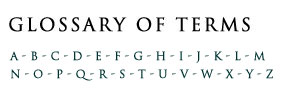
Glossary of Terms - R
Rated Policy
A policy for which the insured pays a higher-than-standard premium because of a higher risk due to a physical impairment, past medical condition, hazardous occupation, or a hazardous hobby. This type of policy is sometimes called an extra-risk policy.
Refinance
In banking, refinance means to change the maturity date, the interest rate, or the amount of existing debt. With loans, it means to pay off an existing loan and replacing it with a new one, usually in a different amount, longer term or at a lower interest rate.
Renters Insurance
Insurance for renting tenants. A typical renters policy consists of two main components: liability coverage and personal property coverage.
Replacement Cost
The cost of replacing or repairing lost or damaged property without allowing for depreciation in value or considering the market value.
Residual Value
The expected value of an asset at the end of a specified period, such as the value of a car at the end of the lease.
Reversion
The return, by operation of law, of property ownership rights to the original owner or that person's heirs after the expiration of an estate created by the owner's transfer of property to another person.
Rider
A provision attached to a policy that adds benefits not found in the original policy or that changes the original policy.
Risk
In finance, risk is the possibility of losing or of not gaining in value. For insurance purposes, risk refers to the probability that a given covered event, such as death or a car accident, will occur. In terms of investments, risk is a measure of a particular investment's volatility and of the possibility that it will cause an investor some degree of financial loss. Specific types of risk include actuarial risk, interest rate risk, inflation risk, and credit risk.
Risk Management
Procedures to minimize the adverse effect of a possible financial loss by identifying potential sources of loss, measuring the financial consequences of a loss occurring, and using controls to minimize actual losses or their financial consequences.